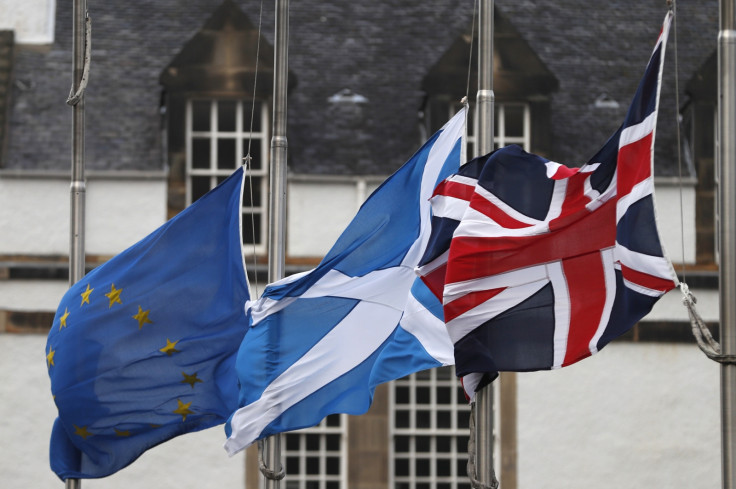Is Scotland becoming the 'Northern Panama' of the offshore world?
Recent revelations suggest Scotland is effectively flaunting the system to attract dubious business from Eastern Europe, Martin Kenney writes.

Scotland is becoming a significant offshore service provider to businesses and individuals from across the globe. The attraction is a less-than-robust anti-money laundering (AML) compliance regime that leaves the services provided by Scotland open to abuse and vulnerable to tax evasion and money laundering schemes.
When news of the Panama Papers broke, the furore saw the 'big guns' – countries like the UK and the US – targeting Commonwealth territories such as the British Virgin Islands (BVI). The BVI, where my firm is based, came in for dreadful abuse from other developed nations.
The gripe was that their nationals were using BVI offshore company formation services to further their legitimate (and sometimes less than legitimate) business and tax mitigation ambitions.
As a fraud investigation and asset recovery lawyer, I chose to make the BVI my adopted home, basing my practice here in 2005.
Our work is highly focused and regularly sees my team following money trails around the globe. So I can speak with confidence when I say that the BVI was seriously slighted post-Panama Papers.
The big nations effectively singled out the BVI for special treatment, and why not? When you have well-organised, anti-offshore non-governmental organisations (NGOs) and media outlets in the UK and US, a small spec in the Caribbean Sea makes for an easy target, especially when you are seeking to misdirect blame or do not understand the real challenges that anti-corruption and anti-fraud investigations face.
The truth is that the vast majority of those overseas citizens who had accusing fingers pointed at them - for having the audacity to open a BVI corporate entity - had done absolutely nothing wrong. Yes, they had avoided paying taxes. But tax avoidance is lawful. Being tax efficient is not a crime. Tax evasion is.
The fallout is such that many legitimate individuals and companies who would have opened tax efficient companies in the BVI are shying away due to the possibility of negative publicity. Those few who were acting criminally have simply taken their lies elsewhere.
Company formations accounted for approximately 50% of the BVI government's revenues. The problem the BVI is now facing is a drop of 35% in new incorporations, which for this small collection of islands is a significant loss in revenue.
The BVI compliance regime was strong pre-Panama Papers. Ultimate Beneficial Owner (UBO) identification documentation had to either be held or objectively available to local registered agents by law. Subject to limited exception, very rarely did we obtain a BVI court UBO disclosure order only to be frustrated by a lack of useful information. The new post-Panama Papers regime is even more rigid and effective.
Double standards aplenty
The same cannot be said of offshore companies in the US, where the States of Nevada and Delaware, for example, do not require local company formation agents to gather verifiable UBO identification information.
This fact is one reason why hardly any Americans were implicated in the Panama Papers; there was no need for them to go further afield. But this didn't stop the US from joining in the pack mentality where the BVI was concerned.
So we can add Scotland to the equation, where a lack of effective compliance (in all likelihood by design), has made Scotland an attractive location for Russians and others to set up their offshore entities.
The ongoing investigation into the mechanics of a sale of a wood factory linked to Belarus by the KGB is an excellent case in point. This means that two of the biggest detractors and outspoken jurisdictions who singled out the BVI as some sort of money laundering paradise are actually two of the biggest culprits.

In May 2015, a Kroll report was leaked by the Speaker of the Moldovan Parliament, Andrian Candu. It set out the facts surrounding a 2012-14 fraud that crushed three Moldovan banks by relieving them of $1bn (£770m) or one-eighth of the annual GDP of Moldova.
A fleet of 48 British shell entities including several Scottish limited partnerships were used as conduits to wash the proceeds of the fraud. If this is the case, where is the hue and cry about Scotland? The tactic of misdirecting blame has worked brilliantly.
The baying NGOs and media outlets who want tax 'loopholes' closed offshore need to be careful what they wish for. Don't be surprised if companies move elsewhere, taking their wealth and jobs with them.
This is why the big jurisdictions didn't suddenly start amending their tax laws: to do so could have damaged their economies further. The politics of envy is a dangerous one, and knee jerk reactions as we saw when the Panama Papers were released can seriously damage those who can least afford it - such as the citizens of the BVI.
This latest Russian scandal implicating Scottish offshore service providers in skullduggery comes as no surprise. The UK prides itself on having an open register of shareholders of companies available to be searched for free from anywhere in the world. This is all well and good, until it comes to notice that Scotland is effectively flaunting the system to attract dubious business from Eastern Europe.
So as the people of the BVI struggle to manage a substantial income deficit thanks in no small part to the vociferous criticisms of anti-offshore commentators in the UK and US, these nations continue to offer secrecy and offshore facilities to the world's ne'er-do-wells with impunity, as all they need to do is point their fingers elsewhere to misdirect home-borne criticism.
The governments of the UK and the US – as well as local NGOs and media outlets – were disingenuous at best when they defamed the BVI. At worst they were hypocritical. The damage to the BVI has been unhelpful. And it is a credit to the people of these islands that they have dealt with the fallout with a dignity and graciousness that the bigger countries would do well to replicate.
In fact, those who have continuously slighted the BVI on the back of the Panama Papers would do well to remember the words of American psychologist Dr. Wayne Dyer: "The highest form of ignorance is when you reject something you don't know anything about."
Martin Kenney is managing partner of Martin Kenney & Co. Solicitors, a specialist investigative and asset recovery practice based in the British Virgin Islands. Kenney focuses on multi-jurisdictional fraud and grand corruption cases.
© Copyright IBTimes 2025. All rights reserved.






















